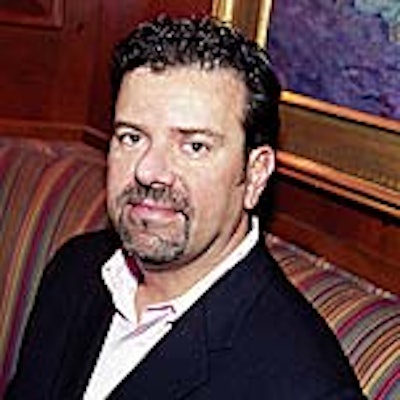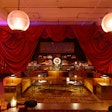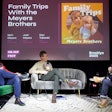
Title: Director, Special Events Marketing
What he plans: About 100 events a year, including weekend-long parties for customers around big sporting events, plus internal events like sales meetings, and lots of client entertaining. His smart strategy this year: using synergy with parent company Walt Disney to save money—this year's sales meeting is at Disney World.
Staff: A team of 6 people
Budget: "It's increasing moderately along with the cost of living—three percent per year."
Career path: Before moving to ESPN Inc. two years ago he did events for two years at ESPN the Magazine, and worked at Madison Square Garden for six years.
Age: 44
Favorite venue: "I’m a fan of Wrigley Field in Chicago."
Favorite hors d'oeuvre: Scallops wrapped with bacon
Where he lives: Mamaroneck, Westchester County
How has the economy affected your events this year?
We've done well to maintain our level of hospitality, but we've toned it down a bit so it's less ornate. We try to cut the—things like ice sculpture and frivolous displays—and put more money into the menu.
How do you make an event effective when budgets are going down?
By spending smart in terms of bang for your buck. The venue is perhaps the key element. If I'm trying to put together a big elegant dinner and I'm going to an Irish pub, that's not a smart venue selection. I've got to go to Daniel. I'll spend more on a great venue and great dinner and not try to take a lesser venue and dress it up—I don't think that's effective.
Where do you find new vendors?
A lot of it is word-of-mouth. My florist might recommend a lighting person, or a colleague. And, of course, BiZBash.
How do you keep yourself engaged in your work?
Ten- to 12-hour days keep me engaged. It's hectic and exciting, and more than enough on my plate right now.
How do you convince other people that events are still important?
I get tremendous support from my boss, and there's a prevailing philosophy here that supports our work. They believe it to be an important 25 percent that helps drive our business.
Does it help that sports are about big events themselves, so it's automatically an event-driven atmosphere?
We're lucky to have those things, but there are different levels of competition. Iowa lacrosse doesn't draw the same excitement as the World Series. On the other hand, we have people who do want to see Iowa lacrosse, and it's our job to help them.
What do today's guests expect at an event?
I think people get treated to a lot of things. They look to us for access to sporting events, athletes and celebrities—things they can't easily acquire on their own. We're constantly brainstorming as to how we can use our resources internally and externally to provide these unique ESPN experiences. Within our network of contacts we might be able to get an athlete or sports executive to attend and be part of an event.
How has your work changed this year?
I have more responsibilities. We're still growing as a company and it's reflected in our department's workload. New clients represent new opportunities, and we have to jump in and help out.
What trends are you seeing in event style?
Sports memorabilia auctions have run their course. That's a trend I'd like to see change, because it continues.
What's your biggest challenge right now?
Keeping things fresh, new, different and unique while not disregarding the successes we've had. When you have a great event you're tempted to repeat it, and you can, but you have to enhance it. Once it's become static you've lost your touch. The Pig Roast we did at the Great Outdoor Games in Lake Placid in 2002 was a great event—we had games, live music, entertainers, and it was like a county fair. This year we were in Reno and we made it bigger and better. We had a bigger pig, enhanced the games and activities, and we spent more money on the music because we realized that was a key element. Also, our ESPY awards post-party—we had a tremendous athlete turnout this year, but we didn't make a point of ushering them to the V.I.P. area. If they found it, great. Last year we brought them right to the V.I.P. area. A lot of the athletes just mingled with most of the guests. Our clients were amazed at the access they had to the athletes.
Is the definition of a successful event changing?
If our advertisers and cable and satellite partners feel it was a successful event, that makes it successful. It comes right back to them.
What was the best event you attended this year that you didn't plan?
HBO's Post-Fight Party in Las Vegas at Fiamma in MGM. They always throw great events. HBO does it right: access to boxers, good food and great venues.
Is it a challenge or a benefit to be part of big parent corporation like ABC?
It's a little of both. It's great to have the resources and partnership, but as in any corporate environment there are challenges like bureaucracy and hierarchy. But that doesn't get in the way with us. It's not a big roadblock. I'd say yes, it's a real benefit for us.
What's it like having to plan both internal and external events?
It's like changing your batting stance. Sometimes you're going to bunt, sometimes swing away. It breaks up the challenges we face. If everything was, "We need a new client experience," you'd burn out. When you spin it back and have to put together a business meeting, it breaks up the workload.
What's your favorite event to plan?
I'm a big fan of the Pig Roast, but I like our Super Bowl golf outing and Winter X Games.
What's the biggest challenge in dealing with athletes at events?
Athletes and celebrities to me are essentially the same challenge. These folks are fortunate enough to have access to anything, anywhere in the world. If I want Michael Jordan to attend an event, meeting his needs is a challenge. He gets invited to hundreds of events a year, so why would he want to attend something? That's the challenge—and making sure they're not overwhelmed by an adoring public and signing autographs. We're always looking for ways to utilize the athlete appearance that's a win-win.
—Erika Rasmusson Janes
What he plans: About 100 events a year, including weekend-long parties for customers around big sporting events, plus internal events like sales meetings, and lots of client entertaining. His smart strategy this year: using synergy with parent company Walt Disney to save money—this year's sales meeting is at Disney World.
Staff: A team of 6 people
Budget: "It's increasing moderately along with the cost of living—three percent per year."
Career path: Before moving to ESPN Inc. two years ago he did events for two years at ESPN the Magazine, and worked at Madison Square Garden for six years.
Age: 44
Favorite venue: "I’m a fan of Wrigley Field in Chicago."
Favorite hors d'oeuvre: Scallops wrapped with bacon
Where he lives: Mamaroneck, Westchester County
How has the economy affected your events this year?
We've done well to maintain our level of hospitality, but we've toned it down a bit so it's less ornate. We try to cut the—things like ice sculpture and frivolous displays—and put more money into the menu.
How do you make an event effective when budgets are going down?
By spending smart in terms of bang for your buck. The venue is perhaps the key element. If I'm trying to put together a big elegant dinner and I'm going to an Irish pub, that's not a smart venue selection. I've got to go to Daniel. I'll spend more on a great venue and great dinner and not try to take a lesser venue and dress it up—I don't think that's effective.
Where do you find new vendors?
A lot of it is word-of-mouth. My florist might recommend a lighting person, or a colleague. And, of course, BiZBash.
How do you keep yourself engaged in your work?
Ten- to 12-hour days keep me engaged. It's hectic and exciting, and more than enough on my plate right now.
How do you convince other people that events are still important?
I get tremendous support from my boss, and there's a prevailing philosophy here that supports our work. They believe it to be an important 25 percent that helps drive our business.
Does it help that sports are about big events themselves, so it's automatically an event-driven atmosphere?
We're lucky to have those things, but there are different levels of competition. Iowa lacrosse doesn't draw the same excitement as the World Series. On the other hand, we have people who do want to see Iowa lacrosse, and it's our job to help them.
What do today's guests expect at an event?
I think people get treated to a lot of things. They look to us for access to sporting events, athletes and celebrities—things they can't easily acquire on their own. We're constantly brainstorming as to how we can use our resources internally and externally to provide these unique ESPN experiences. Within our network of contacts we might be able to get an athlete or sports executive to attend and be part of an event.
How has your work changed this year?
I have more responsibilities. We're still growing as a company and it's reflected in our department's workload. New clients represent new opportunities, and we have to jump in and help out.
What trends are you seeing in event style?
Sports memorabilia auctions have run their course. That's a trend I'd like to see change, because it continues.
What's your biggest challenge right now?
Keeping things fresh, new, different and unique while not disregarding the successes we've had. When you have a great event you're tempted to repeat it, and you can, but you have to enhance it. Once it's become static you've lost your touch. The Pig Roast we did at the Great Outdoor Games in Lake Placid in 2002 was a great event—we had games, live music, entertainers, and it was like a county fair. This year we were in Reno and we made it bigger and better. We had a bigger pig, enhanced the games and activities, and we spent more money on the music because we realized that was a key element. Also, our ESPY awards post-party—we had a tremendous athlete turnout this year, but we didn't make a point of ushering them to the V.I.P. area. If they found it, great. Last year we brought them right to the V.I.P. area. A lot of the athletes just mingled with most of the guests. Our clients were amazed at the access they had to the athletes.
Is the definition of a successful event changing?
If our advertisers and cable and satellite partners feel it was a successful event, that makes it successful. It comes right back to them.
What was the best event you attended this year that you didn't plan?
HBO's Post-Fight Party in Las Vegas at Fiamma in MGM. They always throw great events. HBO does it right: access to boxers, good food and great venues.
Is it a challenge or a benefit to be part of big parent corporation like ABC?
It's a little of both. It's great to have the resources and partnership, but as in any corporate environment there are challenges like bureaucracy and hierarchy. But that doesn't get in the way with us. It's not a big roadblock. I'd say yes, it's a real benefit for us.
What's it like having to plan both internal and external events?
It's like changing your batting stance. Sometimes you're going to bunt, sometimes swing away. It breaks up the challenges we face. If everything was, "We need a new client experience," you'd burn out. When you spin it back and have to put together a business meeting, it breaks up the workload.
What's your favorite event to plan?
I'm a big fan of the Pig Roast, but I like our Super Bowl golf outing and Winter X Games.
What's the biggest challenge in dealing with athletes at events?
Athletes and celebrities to me are essentially the same challenge. These folks are fortunate enough to have access to anything, anywhere in the world. If I want Michael Jordan to attend an event, meeting his needs is a challenge. He gets invited to hundreds of events a year, so why would he want to attend something? That's the challenge—and making sure they're not overwhelmed by an adoring public and signing autographs. We're always looking for ways to utilize the athlete appearance that's a win-win.
—Erika Rasmusson Janes



















